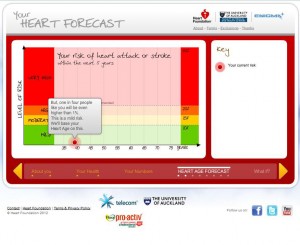Associate Professor Nick Wilson, Dr Nhung Nghiem, Professor Tony Blakely, Professor Rod Jackson
 It is now possible to readily estimate individual risk of future cardiovascular events with a large number of online calculators – including a NZ-specific calculator that has been available for some years (“Know Your Numbers”). In this blog we consider if such risk calculators could be improved upon. The clear answer being “yes” – and in many ways.
It is now possible to readily estimate individual risk of future cardiovascular events with a large number of online calculators – including a NZ-specific calculator that has been available for some years (“Know Your Numbers”). In this blog we consider if such risk calculators could be improved upon. The clear answer being “yes” – and in many ways.




